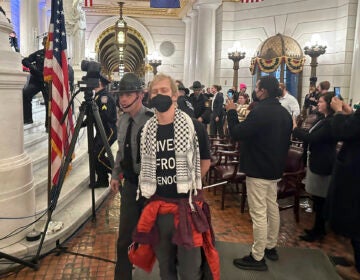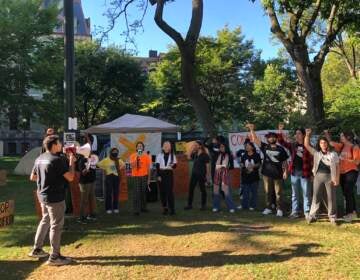In fourth week of protests, calls for better conditions for strip club workers
STILETTOS, a group demanding better health and safety inside Philly’s strip clubs, is coordinating aid for sex workers.
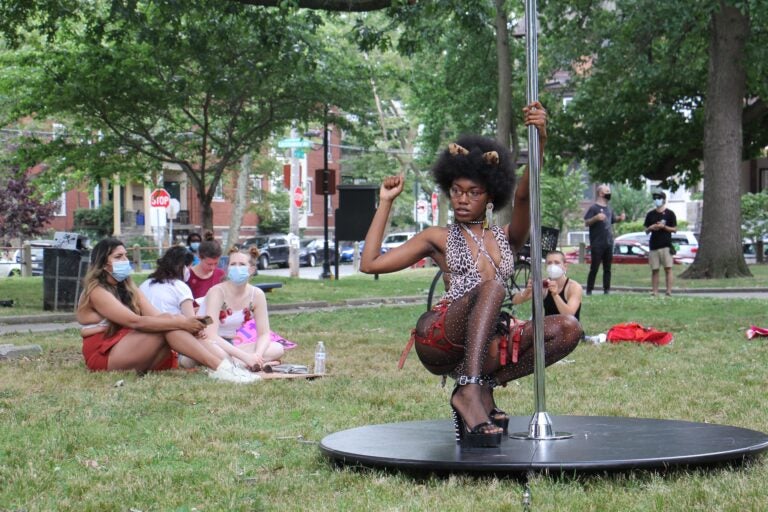
A dancer known by the professional name Tabz poses with a dance pole at Malcolm X Park. She is a leader of the group Stiletto, which held an event in the park to advocate for better working conditions for dancers and sex workers. (Emma Lee/WHYY)
Worldwide protests sparked by the Memorial Day death of George Floyd at the hands of Minneapolis police have stretched into their fourth week in Philadelphia.
A handful of events were scheduled for Saturday — including a dance rally in support of Black Lives in West Philly, health care workers calling for the abolition of police and prisons at City Hall, and sex workers calling for safe conditions during the pandemic at Malcolm X Park.
STILETTOS, a newly formed group, is demanding better health and safety inside Philly’s strip clubs, and are coordinating aid for sex workers.
A corner of the park had a festive vibe, with well over a hundred people spread out on the grass watching pole dancing, fire hooping, and a bullwhip demonstration. Spectators scrambled to toss dollar bills and cheer as performers twisted around a tall metal pole, wiping it down with disinfectant in between.
A professional dominatrix named Mistress Lilith just started cracking a bullwhip to wide applause.
Crowd on hand is up to maybe a hundred. Almost all young people, all in masks, even if some are otherwise scantily clad. pic.twitter.com/RQpbSbJTbc— Zachariah Hughes (@ZachHughesNews) June 27, 2020
Meanwhile, volunteers sold raffle tickets to raise funds for organizing efforts and collected supplies to redistribute to sex workers in need.
“We need to have standards in these clubs and hold them accountable,” said Bamm Rose, a member of STILETTOS who has worked as a pole dancing instructor as well as in strip clubs.
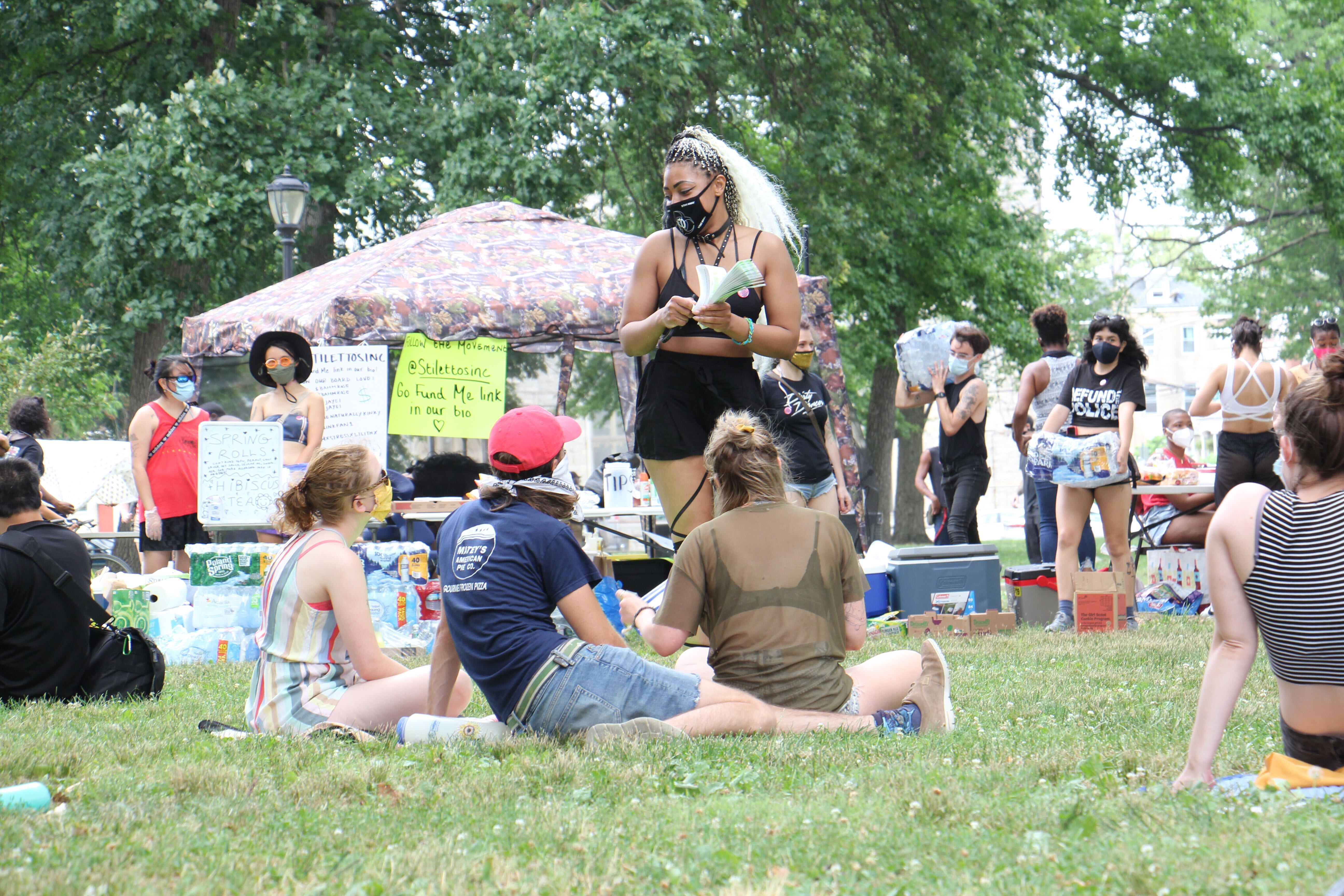
She believes working conditions in many Philadelphia clubs were substandard to begin with, and as businesses re-open, she and others are pushing for better health protections to keep dancers and staff safe from the coronavirus.
“This is a very contact business and industry,” she said, noting that customers should be required to wear masks, among other steps.
Beside Rose was a person who uses the professional name Mxstress Lilith, clad mostly in leather, a fellow organizer with STILETTOS. Lilith, who uses they/them pronouns, said one of the biggest labor problems dancers like them face is their status as independent contractors in the industry.
“Our relationship with these clubs looks more like an employee, but we reap none of the benefits,” Lilith said.
The organization distributed a list of grievances and demands, including things like firmer protections from sexual assault and harassment, more frequent cleaning of facilities, and basic medical and first-aid training for staff.
If conditions don’t improve, Lilith said, people will start agitating and striking.
Both dancers say the current wave of activism across the country has been a catalyst for their recent efforts, and that policing, race, and human rights are all issues that intersect directly with sex work.
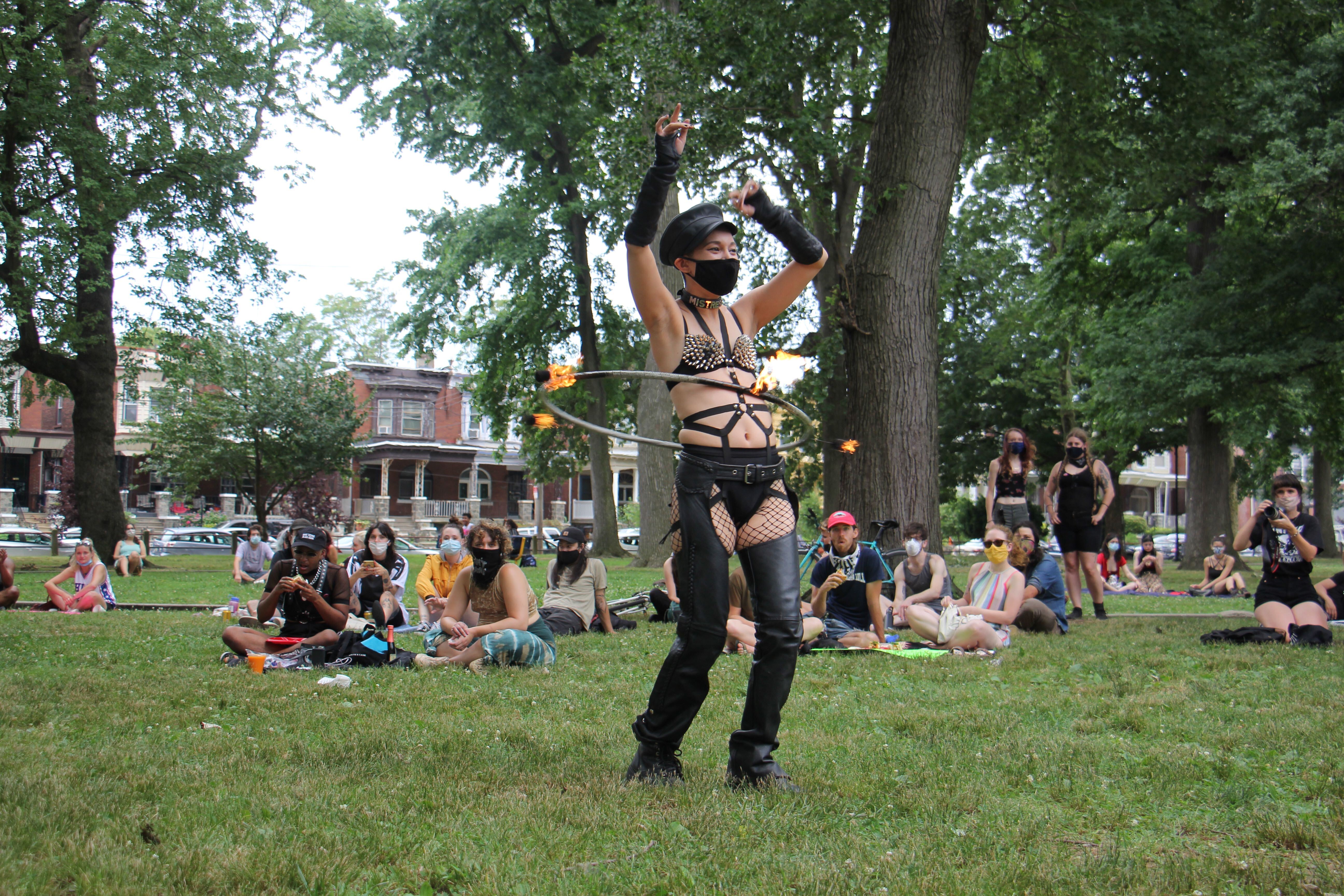
Meanwhile, partner organizations set up stations to collect and give out supplies. Project SAFE, a Philadelphia based group that focuses on harm reduction efforts and mutual aid, as well as the Philly Red Umbrella Alliance, helped coordinate the day’s event with STILETTOS.
“We’re making sure resources are redistributed,” said Raani Begum with Project SAFE. They asked for donations needed by sex workers, particularly those who have lost income during the pandemic shutdown, including mestral products, make up, underwear, condoms, and clothing. They also established a relief fund to get cash into people’s hands.
Mistress Lilith has commenced the fire hooping.
“Make sure you tip her!” Some one yells.
“What’s her Venmo?!” Someone else yells.
“Donate it to the cause!” Lilith yells.
STILLETOS is fundraising organizing efforts. pic.twitter.com/6ZLdNO7ULt— Zachariah Hughes (@ZachHughesNews) June 27, 2020
Ginger Hanson doesn’t work in the industry but came out to the event to show support for sex workers. She held a hand-made sign reading “Sex work is just regular-ass work,” and says people deserve to be paid fairly and given proper benefits and support.
“It’s so vilified, it’s treated like a moral thing and then because it’s treated as immoral they don’t get paid,” Hanson said of sex work.
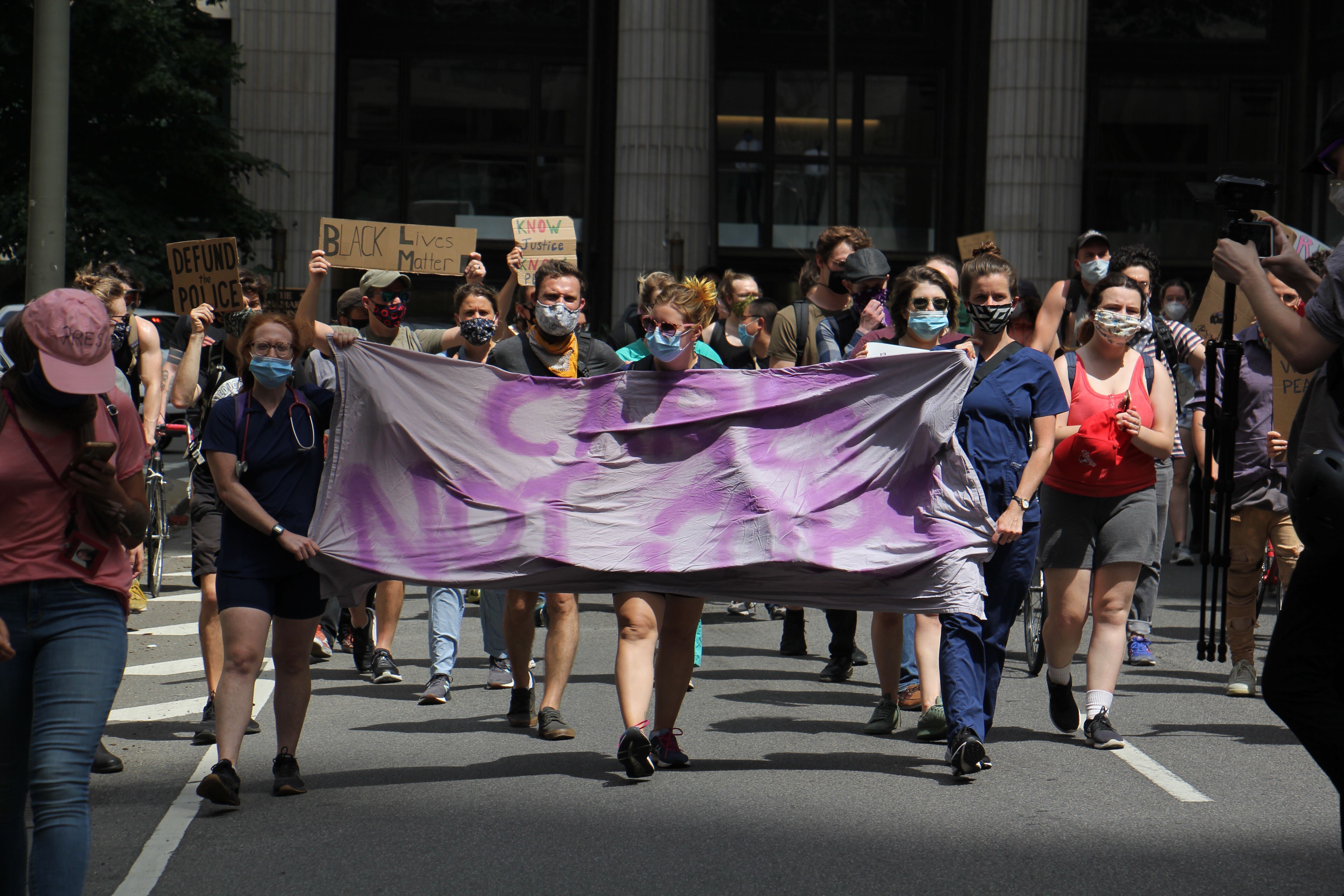
Protesters block Hahnemann at Care Not Cops rally
Outside an entrance to shuttered Hahnemann University Hospital, protesters, many of whom said they were nurses, doctors, teachers and mental health professionals, barricaded the street with wooden pallets and chains.
I’ve now moved over to Race Street, not far from City Hall, where a very different situation is brewing. Protesters have barricaded the street outside Hahnemann Hospital. Cops looking on. pic.twitter.com/nhoQts2ZW2
— Katie Meyer (@katieemeyer4) June 27, 2020
There were about 75 in a decentralized type group. No one in particular had organized the action. One demonstrator described it as “pretty democratic.”
Mickey, a protester who didn’t want to give her last name, said they blocked the entrance because the loss of Hahnemann has hurt the largely poor communities who received care there. She and other protesters, she said, now view it as a symbol of private interests’ greed.

“Hahnemann served the unhoused and the Black community of Center City. It lost money as a result, because it cared for people,” she said. “And they closed it. They’re just closing it to develop it to turn it into more condos.”
The action had a large police presence who mostly kept their distance.
After protesters erected several tents outside the Hahnemann entrance and constructed their barricade, police brought in one of the buses that they use for mass arrests. As the bus approached, protesters decided to pack up and get out.
A contingent of police then brought out bolt cutters to take apart the barricades, which had cut off part of Race Street.
Yelling to the rest of the group, Mickey said they’d be back at Hahnemann soon, with a group big enough to “take” the hospital. From there, they made their way to Sister Cities Park.
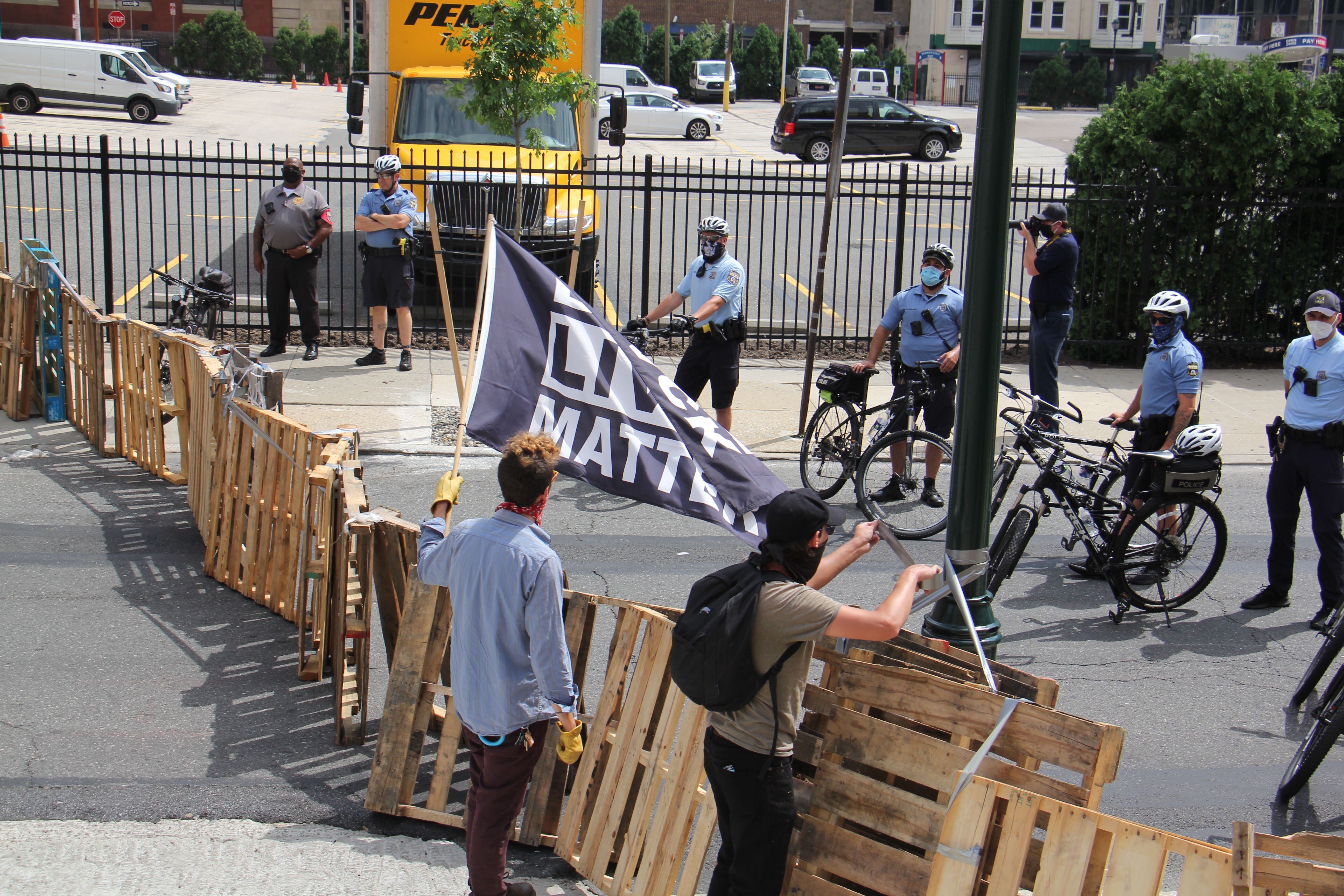
Hahnemann closed almost a full year ago, after California-based private equity investor Joel Freedman, who owns the hospital through his company Broad Street Healthcare Properties, filed for bankruptcy.
It had been Drexel University’s primary teaching hospital before that and had operated in Philadelphia since 1848, long serving some of the city’s poorest residents.
The building became a source of controversy early in the COVID-19 pandemic, when the city looked into using the hospital as a quarantine facility. Freedman offered to sell it, then floated a rent price that officials said was much too high.
The city ultimately abandoned the idea.
Bring in the brass (and woodwinds)
If you happened to walk by Philly’s Art Museum on Saturday afternoon, there’s a very good chance you could hear the strains of Stevie Wonder’s “Superstition” emanating from the entrance.
A group of saxophonists, trumpeters, trombonists, tubists, drummers, and a crowd of about 100 onlookers with Black Lives Matter signs gathered there, as organizer Jeff Bradshaw put it, to sound a “clarion call” in support of cutting police funding.
I cannot be impartial here, these guys are great. pic.twitter.com/r8qRIYK7gm
— Katie Meyer (@katieemeyer4) June 27, 2020
“You know, back in ancient times when the armies would go out on the battlefield they took bands,” he said. “We’re marching in the battle. This is our protest. But also, music has a way of healing and bringing calm, and today we’re bringing both.”
Bradshaw, a trombone player, organized the event with tuba player Sam Gellerstein.
They said they both got fed up with feeling like they were watching the ongoing protests from the sidelines, and tapped into the one resource they had in spades: lots of musicians’ phone numbers.
Don’t want to let the horns distract from the message — lots of BLM and defund the police signs out here. Also a v good Superstition solo on what I think is a sopranino sax pic.twitter.com/0H3PFT80Y4
— Katie Meyer (@katieemeyer4) June 27, 2020
“We got in touch with each other,” Bradshaw said. “He called everybody he knew, I called everybody I knew…and tried to get everybody out here so we could put some good back in the world and raise awareness, in our way, of social injustice.”
Most of the ad hoc band was made up of local musicians, but Gellerstein noted that some people traveled in: one guy from New York, one from West Virginia.
The message they’re trying to send, he added, is specific.
“We’re really trying to be heard,” he said. “We need the mayor to know that his budget for the police compared to the arts, compared to everything in general, it’s not right and we can’t have that.”
It’s a message that, to some degree, is already making its way around city government.
Mayor Jim Kenney has said he agrees with City Council’s decision to remove his planned $19 million boost in police funding from the budget. Council passed the adjusted plan Thursday, and Kenney is expected to sign it this coming week before the fiscal year ends June 30.

Get daily updates from WHYY News!
WHYY is your source for fact-based, in-depth journalism and information. As a nonprofit organization, we rely on financial support from readers like you. Please give today.


